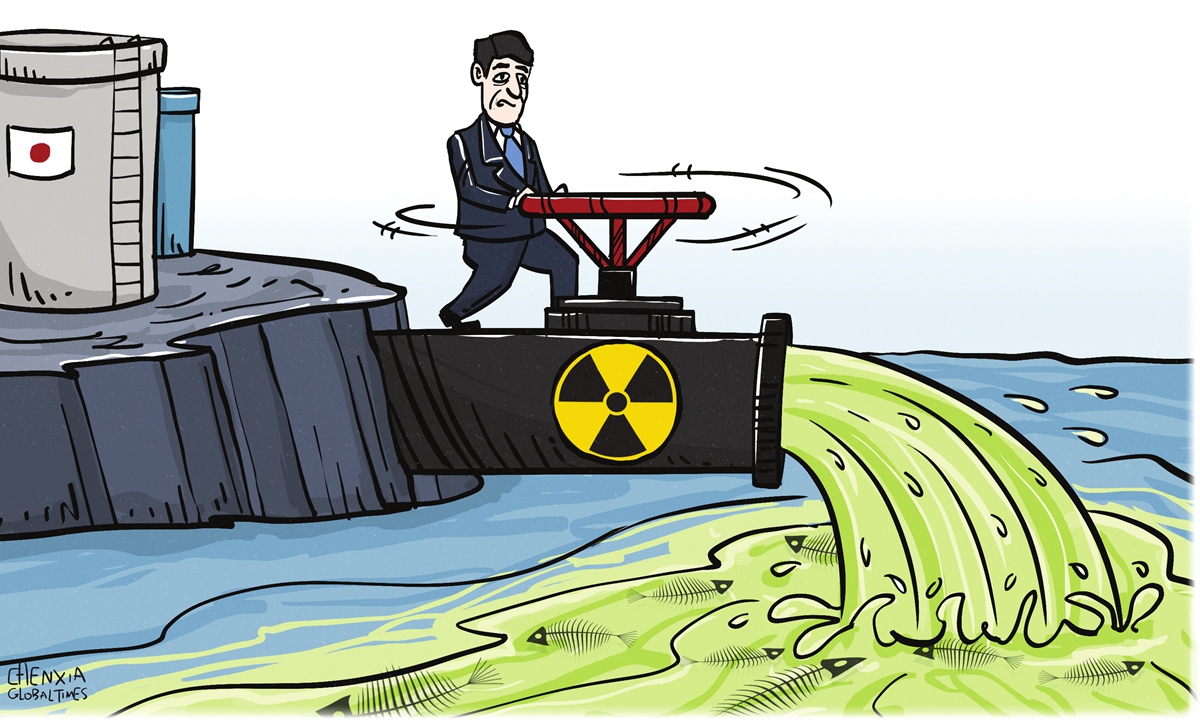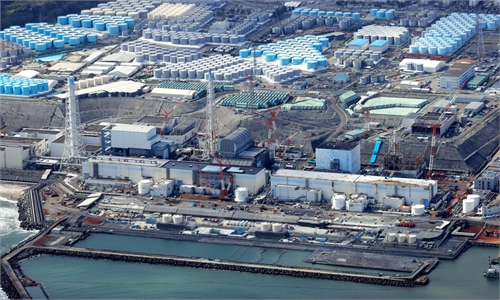
Illustration: Chen Xia/Global Times
Although Japan's plan to dump nuclear-contaminated water into the sea has been strongly opposed by the international community, Tokyo is still going its own way and speeding up the plan to make the rest of the world pay for it.
According to the Japan Times, government sources said on Wednesday that Japan will seek the endorsement of the G7 nations for its plan to discharge nuclear-contaminated water from its crippled nuclear power plant in Fukushima Prefecture into the Pacific Ocean when it hosts a meeting of the group's energy ministers in April.
On March 11, 2011, a 9.0-magnitude earthquake occurred off the coast of northeastern Japan and triggered a tsunami, resulting in a nuclear leak at the Fukushima Daiichi Nuclear Power Plant. Faced with many options for dealing with nuclear-contaminated water, the Japanese government chose to dump it in the ocean because it takes the shortest time and costs the least.
Japan's attempt to draw other G7 members over to its side is through hosting a G7 meeting, a platform where it is easiest to reach consensus. Tokyo's aim is very obvious. This is also a kind of public opinion manipulation to cover up its own wrongdoing.
Dumping nuclear-contaminated water into the sea has not only sparked controversy within the country, but also met with strong opposition from neighboring countries such as China, South Korea, and Russia. Therefore, Tokyo wants the Western camp to endorse it in order to find legitimacy for its actions.
If the "treated water" claimed by the Japanese government is really safe, why is it being dumped into the Pacific Ocean? Today, when water resources are so tight, the Japanese government can use "treated water" for irrigation, breeding, or other purposes. Similarly, the Japanese government insists that the dump of nuclear-contaminated water is under the supervision of the international community, but why did it arbitrarily decide before the International Atomic Energy Agency completed its supervision? Tokyo's guilt is self-evident.
After the Fukushima nuclear disaster, China, Russia, South Korea, and other countries were the first to give Japan a helping hand. However, Japan returned their kindness by ignoring the lives, health, and safety of people in neighboring countries.
The US, which claims human rights come first, is turning a blind eye to Japan's move. The US is also a victim of the accident. A large amount of pollutants have drifted from west to east to the US coast due to ocean circulation along the North Pacific Current. Nevertheless, in order to maintain the alliance between the US and Japan and achieve the goal of dominating East Asia, Washington continues to tolerate Tokyo.
Indeed, it is not just the US that turns a blind eye to Japan on certain issues; Japan does the same with the US on many things. For instance, the whole world is paying close attention to whether Washington planned the Nord Stream explosion, but the Japanese government, which has always been actively involved in international affairs, has kept a low profile this time. In a sense, Japan and the US are covering up each other's scandals. In order to maintain the bond of the so-called alliance between them, they do not hesitate to ignore facts and violate science.
After the nuclear-contaminated water is dumped into the sea, it will quickly spread to most parts of the Pacific Ocean, thereby affecting the global oceans. According to marine biologists, radiation will be absorbed by marine organisms and enter the human body along the food chain, which is a major threat to the Pacific Rim countries and the ecosystem on which all human beings depend.
It is not a matter that relates to a single country. Rather, it is a matter of the security of neighboring countries and sustainable security of the international sea food chain, and the health of future generations. Therefore, it deserves high attention from the international community. Some said Japan's dumping of nuclear-contaminated water has got the approval from its big brother, the US. However, this is both a scientific and humanitarian issue. Japan should explain it to the world, not Washington, in an open and transparent manner. It should also work with relevant international organizations and scientists from neighboring countries.
G7 are not in a position to give scientific evaluation of Japan's discharge of Fukushima contaminated water. If they do agree on a statement that endorses Japan's plan, they have to bear the responsibilities for what Japan should bear.
Japan's attempt to mislead international public opinion and woo the Western bloc is irresponsible and will not work. Japan is not only dumping nuclear-contaminated water, but also its morality too. A Japan that tampers with its history of aggression, a Japan that disrupts the international order, and a Japan that harms the homeland of mankind, will never be able to stand up with dignity.
The article was compiled by Global Times reporter Liu Zixuan based on an interview with Liu Jiangyong, vice dean of the Institute of Modern International Relations at Tsinghua University. opinion@globaltimes.com.cn

